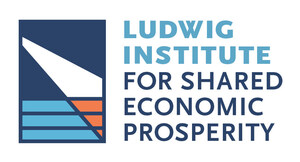Cost of Basic Necessities Rise at Fastest Rate Since 2004, Says Ludwig Institute
Driven by jumps in housing, food, transportation costs, LMI families feeling the crunch
WASHINGTON, Oct. 26, 2023 /PRNewswire/ -- With the costs of everyday necessities on the rise last year, middle- and working-class families felt the biggest crunch on their bank accounts since 2004, according to an analysis by the Ludwig Institute for Shared Economic Prosperity (LISEP).
LISEP today issued data for its 2022 True Living Cost (TLC) Index, a measure of price changes for the minimum adequate needs required to maintain a basic standard of living. Unlike the Consumer Price Index (CPI), the TLC focuses on the basics: housing, food, healthcare, childcare, transportation, basic technology, and miscellaneous personal care and household items – the expenditures that consume nearly the entire budget of most American families. By contrast, the CPI focuses on a diverse basket of more than 80,000 items, many of which — such as rental cars, second homes and hotel rooms — are less representative of the day-to-day household costs low- and middle-income families routinely face.
"We know middle- and working-class families are struggling to make ends meet, with rising prices and stagnant wages combining for a one-two punch just ahead of what could be an inevitable knockout blow," said LISEP Chair Gene Ludwig. "The focus for policymakers should be on getting prices down for the basics — a roof overhead, food on the table, medical care, basic transportation, and the like. Until essential needs are met, the rest is irrelevant."
The TLC's 7.8% year-over-year increase for 2022 was the highest increase since 2004, when the index increased by 8%. The increase was fueled by a spike in housing costs, which were up 10.4% — second only to the 11.8% housing increase in 2004. Transportation was up 11%, and food prices were up 10.1%, both all-time highs going back to 2001.
And even though historically the CPI has understated the impact on rising prices compared to the TLC — the TLC has risen 40% more than the CPI since 2001 — for 2022, the CPI increased by 8%, or 0.2 percentage points more than the TLC. The CPI also posted a 15.4% transportation cost increase (versus the 11% measured by TLC), primarily due to the TLC measuring only necessary travel expenses and factoring out recreational travel and airline ticket prices.
Meanwhile, LISEP's True Weekly Earnings (TWE) metric, when adjusted by TLC, shows earnings were up 0.6% for 2022 — but down 4.6% since 2001.
"While it is encouraging that over the past year middle- and working-class families have not lost ground, they are still struggling just to break even, which is in no way sustainable in a healthy society," Ludwig said. "These families have been fighting — and losing — this battle for more than two decades. It is past time for policymakers to take appropriate proactive measures to address this very real societal problem."
The complete TLC report, including a breakdown by family type and household budget category, is available at https://www.lisep.org/tlc. See a video on the TLC Index here.
About TLC
In announcing the debut of the True Living Cost (TLC) metric, LISEP issued the white paper "Determining More Accurate Living Cost for Median- and Lower-Income American Families" (abridged version here). TLC assesses a set of minimal adequate needs that a household requires to function: housing, medical care, transportation, food, childcare, technology, and miscellaneous (e.g. clothing, personal care, and household items) that takes into account household size (the eight household sizes range from one to two adults and zero to three children) and the relevant census region (Northeast, Midwest, South, and West). The TLC tracks change in price for minimal adequate needs over time. As a comparison to the TLC, the Consumer Price Index (CPI) measures rising prices of a whole host of goods and services, many of which are not relevant for middle- and low-income Americans.
About LISEP
The Ludwig Institute for Shared Economic Prosperity (LISEP) was created in 2019 by Ludwig and his wife, Dr. Carol Ludwig. The mission of LISEP is to improve the economic well-being of middle- and lower-income Americans through research and education. LISEP's original economic research includes new indicators for unemployment, earnings, and cost of living. These metrics aim to provide policymakers and the public with a more transparent view of the economic situation of all Americans, particularly low- and middle-income households, compared with misleading headline statistics.
About Gene Ludwig
In addition to his role as LISEP chair, Gene Ludwig is founder of the Promontory family of companies and Canapi LLC, a financial technology venture fund. He is the founder and CEO of Ludwig Advisors, which counsels financial firms on critical matters. Ludwig is the former vice chairman and senior control officer of Bankers Trust New York Corp. and served as the U.S. Comptroller of the Currency from 1993 to 1998. He is also author of the book The Vanishing American Dream, which investigates the economic challenges facing low- and middle-income Americans. On X (formerly Twitter): @geneludwig.
SOURCE Ludwig Institute for Shared Economic Prosperity

WANT YOUR COMPANY'S NEWS FEATURED ON PRNEWSWIRE.COM?
Newsrooms &
Influencers
Digital Media
Outlets
Journalists
Opted In



Share this article